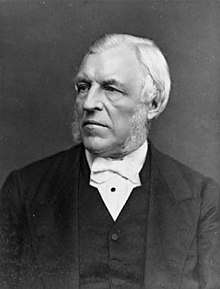Henry Allon
Rev Henry Allon DD (1818–1892), was an English Nonconformist divine.

Life
He was born on 13 October 1818 at Welton, Elloughton-cum-Brough, near Hull, in Yorkshire.
Under Methodist influence Henry Allon decided to enter the ministry, but, developing Congregational ideas, was trained at Cheshunt College, Hertfordshire and became closely associated with the Union Chapel in Islington. For a short while, he was co-pastor at the Union Chapel with the Rev. Thomas Lewis (1844–1852), but thereafter sole pastor for forty years (1852–92). During this time he gained considerable influence amongst metropolitan Congregationalists and secured the funds required for an ambitious rebuilding programme at the Union Chapel, between 1874 and 1890, from designs by James Cubitt.
In 1865, Allon became co-editor with Henry Robert Reynolds of the British Quarterly Review, and in 1877, the sole editor of that journal for another ten years. He published Memoir of the Rev. J. Sherman in 1863, Life of William Ellis in 1873, and sermons on The Vision of God in 1876. Only one hymn is attributed to him, Low in Thine Agony (1868), but he published numerous musical compilations, and his son, Henry Erskine Allon, was a composer (1864–97).
Henry Allon was a vice-president of the American Missionary Association.
He died in Islington on 16 April 1892.
Henry Allon is buried in the London Congregationalists' non-denominational garden cemetery, Abney Park Cemetery, in north London. The large granite Celtic cross lies on the southern section of the western path.
References

- Julian, John (June 1907). A Dictionary of Hymnology. London: John Murray. p. 51.
| Wikisource has the text of the Dictionary of National Biography 1901 supplement's article about Allon, Henry. |